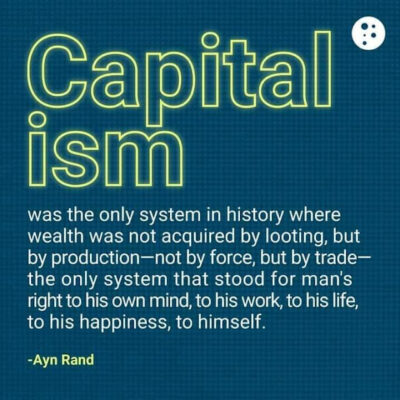Capitalism Never Fails, Only Communists Fail – JP
There is a continuously stronger chorus of voices in the Anglosphere claiming that capitalism has failed.
A rallying cry for decades from the political far left, the critique of capitalism stems from many misunderstandings but mainly from a total lack of awareness of what capitalism actually is and isn’t.
Looking historically, the anti-capitalist movement was spurned in the 20th century by the Marxists and Maoists, whose relentless march for personal power built the Communist International. Marx called for a communist revolution— an uprising of the workers to replace the wealthy upper class, the bourgeoisie. Realistically, that uprising happened in many countries during World War I and World War II. The great wars of the 20th century were, in other nomenclature, Marx’s fabled communist revolution.
Both Russia and China felt the brunt of this movement. The latter threw off the vestiges of a millennia-old imperial governing system and became a republic, albeit one-party-dominated, in 1949. Collectivist rule, another name for communism, seemed more fitting to control the larger national populations of the post-20th-century information age.
Today, that communist ideology has firmly planted itself in the United Nations and World Economic Forum. The left is dominant, and capitalists are under attack. But this is nothing new. It is simply a power struggle over wealth.
Capitalism is another name for the intelligent and efficient deployment and appropriation of capital— valuable goods, money, resources, and labor. This is why saying capitalism is the problem is a boogieman argument, like saying CO2 causes climate change. It’s a propagandist message that is simple and catchy and encourages extreme stupidity.
Capitalism is also the caring and maintenance of the free market— that means allowing people to trade and decide the value of things (a.k.a. prices) by whatever means they choose. This is the antithesis of the Communist system, where a central national or federal governing structure sets prices. Such is widely the practice in the EU today. A tome of legalities governs the bounds of prices. Committees of bureaucrats in Brussels spend months deciding the fair price of butter and almost every other commodity exchanged in the marketplace.
Such extreme state-level intervention has become the norm. There have historically been many words used to describe this sort of government control, each associated with varying degrees of the use of military force, fear, jingoism, corporate centralization, and other facets of national culture and society. Some that come to mind are fascism, socialism, statism and Nazism. They are all fruits of the same tree— the tree of government intervention in free markets.
Why is Capitalism always under attack? Simply because powerholders and politicians must feel they have a purpose. They think that they must do something to validate actually being in power. It is unfortunate that most humans, including politicians, display an utter lack of restraint and a remarkably absent ability to simply do nothing at all.
The problem, ultimately, is not Capitalism. It is politicians’ incessant belief that they should intervene in the market and their tendency to do so with no sense of morality, no exposure to working conditions, no communication with all market participants, and no understanding of economics. When politicians do intervene, they do so with extreme prejudice, haste, and incomplete information. They are like little children playing with sandcastles, except the sandcastles are the lives of real people in the economy.
There is a better way to manage free markets and steer Capitalism. Such enlightened capitalism would involve governments protecting people from corporate interests, putting human health and wellbeing first above corporate profits, allowing market actors to determine prices on their own without excessive controls or interventions, and, most critically, allowing market actors, especially corporations, to fail when they have lost money.
None of this has been put into practice in the US, EU, or China in the recent past. Instead, veritable idiots are permitted to champion government intervention under the jingoistic slogans of the anti-capitalists.
Imagine a frog in a pond decrying fresh water entering the pond from a small stream, the pond’s water source. The frog calls for all sorts of actions to stop the fresh water from entering the pond. The frog then wants to manage the water levels, the number of lily pads, the number of crocodiles, the number of snakes, how the water exits the pond, and the list goes on. Every day, the frog calls to manage a new facet of pond life.
Inevitably, the pond would rot or dry up. Without fresh water and natural biodiversity, it would no longer be a pond. And this is the norm today—such an excessive level of state intervention that markets do not function as markets.
Successful capitalism is light-touch with defined barriers. Keep out the snakes, or at least watch them carefully and intervene to stop them quickly and effectively. Uproot the rotten plants and throw them out. Keep the water fresh. And in the meantime, do nothing.
Ultimately, capitalism doesn’t fail on its own. What some people claim as failing is simply the efficient and natural distribution of capital away from their failed ideas. And this is why the communists and statists always think it is failing— because their ideas always become stale and fail. When nobody wants the communists after the revolution to overthrow the bourgeoisie, they are simply thrown out.

